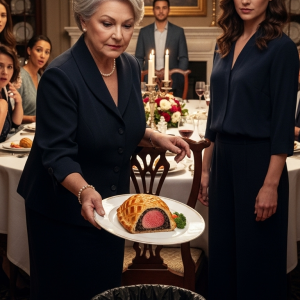The weight of the city felt heavier than usual on Officer Frank Miller’s shoulders. It was the end of a long, thankless shift, a day spent navigating the petty cruelties and casual chaos of Chicago. He had refereed a screaming match over a parking spot, taken a report from a man whose prize-winning pumpkins had been smashed, and dispersed a group of teenagers for loitering. Twenty-five years on the force, and his life had devolved into managing a city full of overgrown toddlers. The hero he had once imagined himself to be had long ago been eroded by a thousand tiny, meaningless disputes.
He sat in his patrol car, the engine rumbling, watching the evening rush hour begin. He pulled out his wallet, his thumb instinctively finding the worn, creased photograph tucked behind his driver’s license. It was a picture of his wife, Eleanor, taken on a beach ten years ago, her face full of a light that had been extinguished far too soon by a merciless, invisible illness. He remembered the weight of the medical bills, the cold, bureaucratic language of the insurance denials. He remembered the feeling of utter, screaming helplessness. He tucked the wallet away, the familiar ache in his chest a dull, constant companion.
The radio crackled, jarring him from his reverie. “Unit 34, we’ve got a 10-91V, a citizen complaint of a public disturbance. Corner of Michigan and Adams. A juvenile, causing a racket.”
Miller sighed, the sound a ragged mix of exhaustion and resignation. A kid making noise. That was the emergency. That was what he was for. He keyed the mic, his voice flat and devoid of emotion. “10-4. Unit 34 responding.” He pulled into traffic, another soldier in a war against… what? A racket. He felt the cynicism in his heart harden into a solid, heavy stone.
He arrived at the corner to find the “disturbance.” It was a little girl, no older than ten, standing small and resolute against the tide of hurried pedestrians. She had a violin tucked under her chin, an instrument that looked old and scuffed, and she was playing with a fierce, focused concentration. The music that poured from it wasn’t perfect, but it was raw, emotional, and achingly beautiful.
In front of her worn violin case, a piece of cardboard was propped up. On it, in a child’s careful, blocky handwriting, were five words: “PLAYING TO SAVE MY MOM.”
Miller felt a familiar, professional annoyance begin to surface. There were ordinances. He was supposed to tell her to move along, to explain that she couldn’t solicit money here. He took a step forward, preparing to deliver the lines he had delivered a hundred times before. And then, the melody she was playing fully registered in his mind.
It was a simple, haunting Irish folk tune. A tune he hadn’t heard in years, but one that was etched into the very fiber of his being. It was Eleanor’s song. She used to hum it while she was gardening, a quiet, happy sound that was the background music of his best memories. He could see her now, clear as day, her hands in the dirt, a smudge of soil on her cheek, that gentle melody on her lips.
The stone of cynicism in his chest didn’t just crack; it shattered. He was no longer a police officer dealing with a minor infraction. He was a man, a widower, listening to a ghost. He saw not a public nuisance, but a little girl, just as desperate and helpless as he had once been, fighting her own war against an indifferent world in the only way she knew how.
He stopped. He didn’t say a word. He didn’t ask her to leave. Instead, he backed away a few paces, found a spot against the cold stone of a nearby building, and folded his arms. He stood at ease, his posture relaxed but his presence undeniable. He was no longer there to enforce an ordinance. He was there to stand guard.
Across the street, in the window of a bustling Starbucks, a DePaul University student named Chloe was trying to study for her midterms. The sound of the violin had drawn her attention, and she had been touched by the little girl’s sign. But what happened next made her forget her textbook entirely.
She saw the police car pull up. She saw the big, tired-looking cop get out. She braced herself for the inevitable, sad conclusion—the little girl being told to pack up, her small act of defiance extinguished. But that’s not what happened.
She watched, mesmerized, as the officer simply stood there, becoming a silent, stoic guardian. His presence subtly altered the geometry of the sidewalk. People who had been rushing past, annoyed, now slowed, their curiosity piqued by the strange tableau. They saw the little girl, they saw the sign, and they saw the cop who was not busting her, but protecting her. They started to listen. And then, they started to give.
A dollar bill floated into the violin case. Then a five. Then a twenty. A small, respectful crowd began to form, a silent audience drawn in by the music and the unexpected moment of grace.
Chloe’s hands were shaking as she pulled out her phone. She started recording, capturing the scene: the determined little girl, the solemn-faced officer, the growing circle of quiet observers. She uploaded the 30-second clip to Twitter, her fingers flying across the screen.
“In downtown Chicago right now,” she typed. “This little girl is playing violin to raise money for her sick mom. A cop got a call to shut her down, but instead, he’s just… standing guard. Protecting her. My heart can’t handle it. This is what our city should be. #ThisIsChicago #Kindness”
She hit ‘post.’ The tweet, a tiny digital bottle tossed into the vast ocean of the internet, began to travel. It was retweeted a dozen times, then a hundred, then a thousand. The video, raw and unfiltered, was a potent cocktail of everything the internet loved: a brave child, an unexpected hero, and a moment of pure, unscripted humanity. Within an hour, it was trending in Chicago.
In the bustling newsroom of ABC Chicago, veteran journalist Sarah Jenkins was monitoring the digital feeds for a lead story for the six o’clock news. Her screen was filled with the usual grim fare: politics, crime, a multi-car pile-up on the interstate. Then she saw it. A trending hashtag, #ViolinVigil. She clicked on it and saw Chloe’s video.
She felt a jolt, the instinct of a reporter who has just struck gold. This wasn’t just a cute video. This was a story. A real story. “Get me a camera crew,” she shouted to her producer, not taking her eyes off the screen. “Corner of Michigan and Adams. Now. Ditch the highway story. This is it.”
Fifteen minutes later, the scene on the corner had transformed. The news van pulled up, and Sarah Jenkins, a familiar face to millions of Chicagoland viewers, stepped out with her crew. The small crowd was now a large one. Officer Miller, seeing the cameras, felt a surge of panic. He hated the media, hated the spotlight. He was just about to tell them to back off when Jenkins approached him, her microphone in hand.
“Officer,” she said, her voice professional but kind. “Sarah Jenkins, Channel 7. Can you tell us what’s happening here?”
Miller was at a loss for words. He just shrugged. “I’m just… listening to the music,” he mumbled.
Jenkins, seeing she wouldn’t get more from the stoic cop, knelt down to speak to the little girl, who had finally stopped playing, her eyes wide with a mixture of fear and wonder. “Hi there. I’m Sarah. You play beautifully. What’s your name?”
“Maya,” the little girl whispered.
“Maya,” Jenkins said, her voice gentle. “Your sign says you’re playing to save your mom. Can you tell me about her?”
And there, on a busy Chicago street corner, with cameras rolling live, Maya told her story. She spoke of her mother, a former teacher who was too sick to work. She spoke of a new, experimental treatment that was their only hope. And she spoke of the letter from the insurance company, a letter she had found in the trash can, its cold, formal language denying them that hope.
The story that aired on the six o’clock news was electrifying. “In a city often defined by its divisions,” Sarah Jenkins’s voiceover began, over a shot of Miller standing his silent watch, “a simple act of kindness on a street corner has ignited a firestorm of compassion. The story of ten-year-old Maya, and the police officer who became her guardian angel, is a powerful reminder that sometimes, the best way to serve and protect is to simply stand and listen.”
The story went national. And in a high-rise office building in Philadelphia, a senior vice president of HealthCorp Insurance was watching, a half-eaten salad on his desk. He saw the name of his company. He saw the image of the brave little girl. He saw the hero cop. And he saw the beginning of a public relations nightmare of epic proportions.
The destruction, when it came, was not of a person, but of a policy. The morning after the broadcast, HealthCorp was inundated. Their servers crashed from the sheer volume of angry emails. Their phone lines were jammed. The story of #ViolinVigil was a national phenomenon.
By noon, they had issued a public statement. “After a thorough and immediate review of the case of Ms. Eleanor Vance, highlighted by recent media reports, HealthCorp has decided to reverse its initial decision and will cover the full cost of her prescribed treatment. We are also launching a full-scale review of our compassionate use policies to ensure we are always putting patients before profits.”
But the community had already rendered its own verdict. A GoFundMe page, started by Chloe the student, had gone viral. By the time the insurance company capitulated, it had already raised over two hundred thousand dollars from strangers all over the country.
The ripple effect of that one, quiet act of kindness was staggering. Maya’s story, and her incredible talent, reached the ears of the dean of the Chicago Music Conservatory, who promptly offered her a full scholarship. A local philanthropist, moved by the story, established “Maya’s Fund,” a permanent community resource to help other families navigate the brutal intersection of illness and insurance bureaucracy.
For Officer Frank Miller, the change was more personal. His own cynicism, a shield he had carried for years, had been destroyed. He had become an accidental hero, a symbol of the compassion he thought his job had stamped out of him.
He visited Maya and her mother, Eleanor, in the hospital a week later, not as a cop, but as a friend. He brought flowers—the same kind of lilies he used to bring his wife. Eleanor, frail but with a new light of hope in her eyes, thanked him through tears. Maya, no longer needing to busk on a street corner, simply hugged his leg and didn’t let go.
He became their friend, their protector, their “Uncle Frank.” In helping them, he had found a way to honor his own past, to channel his own grief into something constructive and beautiful. The ache in his chest was still there, but it was no longer a hollow emptiness. It was full of a new kind of love. He had arrived at that corner a jaded, weary cop, and had left a man who had found a reason to believe in the goodness of the world again, all because he had stopped, and for the first time in a long time, truly listened to the music.
Six months later, the biting Chicago wind felt different to Officer Frank Miller. It was still cold, but it no longer seemed to seep into his bones with the same weary chill. He sat not in his patrol car, but in a plush velvet seat in a warm, acoustically perfect recital hall at the Chicago Music Conservatory. On the stage, bathed in a soft, golden light, was Maya.
She was no longer the small, desperate figure on a grimy street corner, but a poised young artist. The old, scuffed violin had been replaced by a beautiful new instrument, a gift from an anonymous donor, and the music that flowed from it was no longer a cry of desperation, but a song of pure, unadulterated joy. She played a complex, soaring piece by Vivaldi, her fingers dancing on the strings, her small body swaying with a confidence that seemed to make her taller. The raw, emotional talent he had heard on the street had been polished into a brilliant, sparkling gem.
Beside him, a woman gently squeezed his arm. He turned and smiled at Eleanor Vance, Maya’s mother. The frail, worried woman he had met in a hospital room was gone. Her hair had grown back from the treatments, and her face, though still slender, was filled with color and life. The shadow of fear in her eyes had been replaced by a look of fierce, boundless pride as she watched her daughter. Frank had come to know that look well. He saw a reflection of it in his own eyes.
When the final note hung in the air, the hall erupted in thunderous applause. Maya took a bow, her face flushed with happiness, and her eyes immediately found them in the crowd. She gave them a special, beaming smile, and Frank felt an emotion he thought had been buried with his own Eleanor—a simple, uncomplicated surge of paternal pride. He was no longer just a cop. He was, somehow, family.
Later, the three of them sat huddled in a booth at their favorite diner, a place with worn red leather seats and the best hot chocolate in the city. Maya, still buzzing from her performance, was chattering excitedly about her new teacher and the friends she had made at the conservatory.
“Mr. Petrov says if I keep practicing, I might be able to audition for the youth symphony next year!” she said, her eyes wide with the possibility of it all. “Can you believe it, Uncle Frank?”
The name still felt new, a comfortable coat he was just beginning to grow into. “I can absolutely believe it, superstar,” he said, ruffling her hair. “I think you could do anything you set your mind to.”
Eleanor watched them, her expression soft with gratitude. “I still feel like I’m dreaming,” she said, her voice quiet. “Every morning I wake up and I feel… strong. I feel present. Six months ago, I was planning a funeral. Now…” she trailed off, looking at her vibrant, happy daughter. “Now I’m planning a future. All because of you, Frank. You and a hundred thousand kind strangers.”
“I didn’t do much,” Frank mumbled, his old discomfort with praise returning. “I just stood there.”
“No,” Eleanor insisted, her gaze firm. “You didn’t just stand there. You stood for something. You stood for her. For us. You showed this whole city that kindness isn’t a weakness.”
Her words resonated with him. His work had changed. The city no longer felt like a crumbling collection of petty disputes. He still answered the same kinds of calls, but he saw the people differently now. He looked for the story behind the complaint, the fear behind the anger. His colleagues, who had first ribbed him about his newfound fame as the “Violin Vigilante,” now treated him with a new kind of respect. He had, without meaning to, reminded them all of the reason they had put on the badge in the first place.
“Did you hear about Maya’s Fund last week?” Eleanor asked, changing the subject. “Sarah Jenkins—the reporter—she called me. They helped another family. A father who needed a special wheelchair for his son that his insurance refused to cover. They raised the money in two days. It’s still going. The wave you started… it just keeps going.”
Frank nodded, a slow smile spreading across his face. He remembered the feeling of helplessness when his own Eleanor was sick, the feeling of being a small, insignificant man shouting into the void of a heartless system. He knew that feeling was still out there for many, but now, there was an echo. A response. A community that was listening.
After they finished their hot chocolate, they bundled up and stepped out into the crisp autumn night. Their path home took them past the corner of Michigan and Adams. It was just a street corner now, brightly lit and busy with people hurrying home. There was no sign of the small girl who had once stood there, playing her heart out for her mother’s life.
Maya, however, stopped for a moment, looking at the spot. She didn’t look sad. She looked thoughtful. She turned and gave Frank a fierce, sudden hug. “Thank you for being my guard,” she whispered into his thick winter coat.
He hugged her back tightly. “Always,” he said, his voice thick with emotion.
As they walked on, Eleanor on one side of him, Maya on the other, Frank looked back at the empty corner. He thought of his Eleanor, of the song, of the simple, human impulse that had made him stop that day. He had been so sure that his capacity for making a real difference had died with her. But he had been wrong. Love, he was learning, didn’t die. It just sometimes needed to hear the right song to be reawakened. And once it was awake, its power to heal, to connect, and to build a better world, was limitless. The weight of his badge felt lighter than it had in years. It no longer felt like a burden, but a privilege.




